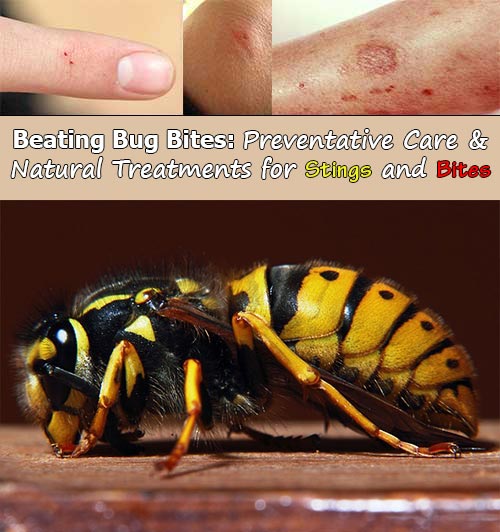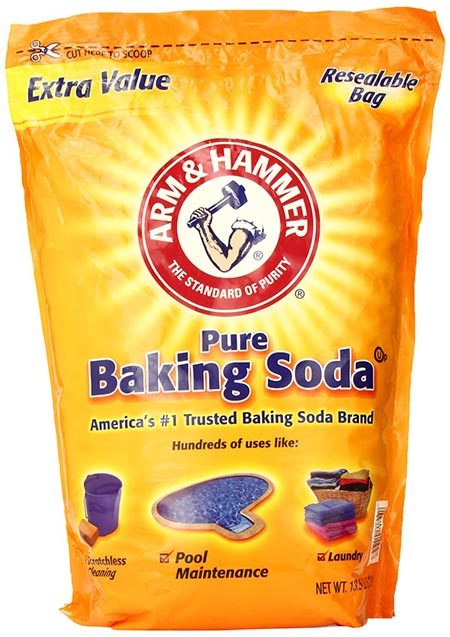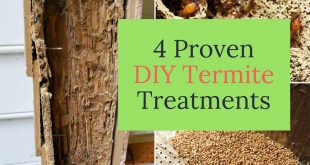Beating Bug Bites: Preventative Care and Natural Treatments for Stings and Bites

This time of year, most of us find a lot of reasons to spend more time outside than we would in other seasons. Between family camping trips, cookouts with friends and neighbors, and extra time spent tending to our lawns and gardens, it seems like when we can be outside, we are, soaking up the sun and enjoying as much time as possible in the fresh air of the great outdoors. The downside of this extra time outside is increased exposure to the pesky pests that the warmer weather allows. Namely, bugs, and their bothersome bites, stings, and skin irritations.
I’m always looking for simple and natural home remedies to the things that literally bug me this time of year, and if you are of like mind, read on for a few simple yet ingenious home remedies for these mild-weather maladies.
Prevention Is the Best Medicine:

Obviously the best way to treat a bug bite or bee sting is to avoid getting one in the first place. As such, there are a number of ways to take preventative measures against bites before they become an issue.
- Insect repellent containing DEET is the most effective way to prevent bug bites. Adults can pretty much use any commercial DEET product provided the label instructions are followed correctly. Extra care should be given to applying these products to children, however, and it is recommended that no child is exposed to a repellent cream with more than 6% DEET content.
- Another way to head off insect attacks is to treat your clothing with a permethrin repellent before a trip to the great outdoors. Permethrin is a synthetic form of a compound found in chrysanthemum plants and does a wonderful job of keeping bugs away but won’t work as well if applied to skin as it will on clothes.
- Another chemical that can be used to discourage insect encounters is called p-menthane-3, 8-diol, aka PMD, aka menthoglycol. This chemical is a natural derivative of eucalyptus, and can be an effective pre-treatment.
- Among the more natural and less chemical common deterrents is Citronella, which is essentially an oil that comes from a type of grass. Citronella can be found in repellent candles and also sprays.
- Another natural way to hinder bugs is to consume garlic in the days leading up to a camping or hiking trip. A clove or two a day can keep bugs away, as they are naturally turned away by the odor produced by your sweat.
- Simple precautions to prevent bee activity are as follows: Limit perfumes and strong smelling personal hygiene products. Also take extra care to keep foods and sweet drinks sealed when not in use. Bright clothing should also be avoided.
- Check out this article called 7 Plants to Rid You of Pesky Mosquitos to see which plants you can have to keep certain insects away.
Naturally Soothing Stings and Bites:

Assuming your best efforts at prevention have failed and you are forced into a treatment scenario, there is a number of natural remedies you can try to minimize the irritation from bee and wasp stings as well as mosquito and other bug bites.
First and foremost, in the case of a bee sting, remove the stinger. The longer it remains inside your skin, the more venom it will inject. You can scrape a stinger away easily with a fingernail, knife blade edge, or an ID or credit card. The key is to use a scraping and not squeezing motion to prevent injecting yourself with more of the stinger’s poison.
Once the stinger is removed, there are a few natural pastes you can use to treat sting and bite sites:
- Baking soda and water mixed into a paste can help draw out some of the venom and ease inflammation as it dries. For larger areas with multiple stings, you can apply a slightly more diluted version of baking soda and water with a cloth soaked in the mixture.
- Crushed aspirin mixed with water can also help soothe stings by neutralizing the venom in the wound and easing inflammation. Just dab the paste over the sting and allow to dry naturally.
- Meat tenderizer also can break down the venom of stings. Just make a paste with tenderizer powder and water and leave it on stings for about an hour. – buy HERE if you don’t know were to get it from.
Certain food products among your camping supplies can be a big boost against bees and other bugs:
- By rubbing a slice of onion over a sting or bite site, you can naturally break down venom and relieve inflammation.
- Sugar can also bring natural relief, simply dab a little water over the sting and apply a fingertip full of sugar to it.
- If you happen to have some papaya available among your camping supplies, simply lay a slice over stings for about an hour to naturally neutralize insect venom.
- A good natural anti-inflammatory treatment is to soak a cotton ball or piece of gauze in apple cider vinegar and hold it on the sting or bite for a few minutes to relieve swelling and redness.
A cold compress or ice pack wrapped in a towel is an easy way to soothe the burn of a bite or sting and relieve swelling. Simply apply to the affected area for 10-15 minutes. To further reduce swelling, you can apply a drop of tea tree oil a few times a day.
Lavender oil will ease itching if a few drops are applied to the sting site. Reapply a drop or two at a time as needed. A drop of two of peppermint oil can have a cooling effect on the skin and increase circulation to the area to promote healing. A dab of peppermint toothpaste can have a similar effect. Menthol is a soothing ingredient in many anti-itch sprays and gels. For an extra boost of relief, apply the product cold. Some commercial anti-itch creams contain mild anesthetics to numb bite sites. Others contain hydrocortisone and antihistamine which can ease swelling and the body’s natural allergic reaction.
page 1 0f 2
 Home and Gardening Ideas At home and Gardening ideas we believe inspiring readers about homesteading, self sufficiency
Home and Gardening Ideas At home and Gardening ideas we believe inspiring readers about homesteading, self sufficiency






One comment
Pingback: Beating Bug Bites: Preventative Care and Natural Treatments for Stings and Bites